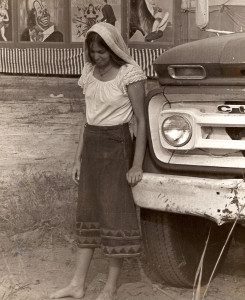[ccfic caption-text format="plaintext"]
By Rama K. Ramaswamy
Last weekend, Wellesley Free Library hosted artist and author Elizabeth Carter Wellington at a reception for her summer photography exhibit in the Wakelin Room, titled “Big Top, 1971,” as a lead-in to her latest novel, “Memoirs of a Circus Girl.”
Wellington’s career includes stints as a Spanish professor and college textbook editor in New England. She received her Ph.D. in Hispanic Language and Literatures from Boston University and holds a Master of Arts degree with a specialization in Latin American Studies from The Johns Hopkins University School of Advanced International Studies (SAIS). Before entering the field of university teaching, she worked for the United Nations Food and Agriculture Organization (FAO) in Rome. Her collegiate language teaching experience is extensive and includes full-time positions at Wellesley, Babson, Simmons and Boston University.
Wellington is married to the Dominican poet, Norberto James, and has published numerous translations of his poems as well as short stories by Dominican authors. At sixteen, Wellington traveled around the world alone, leaving high school to live in India for a year. She later learned to speak French, Spanish and Italian fluently along the way during this “impassioned period” she refers to as “the moth years.” She even found kindred spirits among a Roma group of flamenco aficionados and fell in love with a gypsy who took her with him on his travels throughout Andalucía. Elizabeth Wellington’s works of literary fiction inspired by her experiences from this period include “The Lovers of Córdoba” and her debut novel, “Memoirs of a Circus Girl”.
After speaking about her photograph collection, Wellington also briefly read from her new novel (“Memoirs of a Circus Girl”), scheduled to hit the bookstores this fall. This, she explained, is a coming-of-age story that gives the reader a first-hand account of the discoveries made by a seventeen-year-old (Sarah) as an observer of circus life.
There were about 50 people in the audience, attending Wellington’s presentation. Although Wellington has previously published a book of literary criticism, “Reflections on Lorca’s Private Mythology,” for academic circles, “Memoirs of a Circus Girl” is her first work of fiction. Wellington said she was “encouraged by her son, Tito W. James, who recognized the potential for the story and the characters. Wellington said “he [Tito W. James] is also an accomplished indie comic book writer and loves a good adventure story.” Wellington added: “we got started co-writing a screenplay together. Later I decided to turn the characters we developed into a novel. He is my most reliable writing coach.”
When asked what made her decide to write this adventure, Wellington said, “this is one of those projects in a drawer that eventually saw the light after 45 years. When I finally stopped teaching as a Spanish professor, I knew that I needed to put all my creative energy into writing up the stories I have chronicled over the years in hundreds of diary pages. Fortunately for the circus story, I also had over 100 photographs I’d taken in 1971 to refresh my memory.”
When asked what was her favorite place throughout all her wanderings, Wellington said: “My favorite place was on the back of an elephant as she sank into the river. Second favorite place: up in the air practicing an aerial routine--nothing like the rush when you lie back in a full lay-out and make your descent. I have no favorite geographical location. There is so much beauty to discover in nature and people everywhere.”
A few people in the audience had wondered what specific characteristics Wellington liked in and about circus people as opposed to “regular people” like themselves. When the question was put to Wellington, she said: “They [circus people] are immediate in every way. Living so close to death by attempting such dangerous tricks, they have a heightened way of embracing life. They are also fabulous pranksters and use their physical skills to entertain one another.” She added that circus folk are “different” as a community because, “circus people are very physically active and don’t tend to spend much time watching television - they are too busy practicing their flame-throwing, swallowing swords or keeping their timing perfect for their acrobatic acts.
They also live on the same hierarchical plane as their animals. The animals would often get superior treatment than the working roustabouts we traveled with. The traditional American ‘mud’ circus that sets up for a day in a hay field and then disappears the next day is no longer common in the U.S. The circus people who worked on those shows were different from ‘regular folks’ in that they needed to keep moving to feel at ease. I would have to say that we were almost feral in our nomadic existence, happier to live on the road than settled in a town. No one liked the day off when we stayed on the same lot for an extra day of shows every two weeks on Sundays. Circus people like to keep moving.”
For more information go to: http://www.circusgirlnovel.com.

























